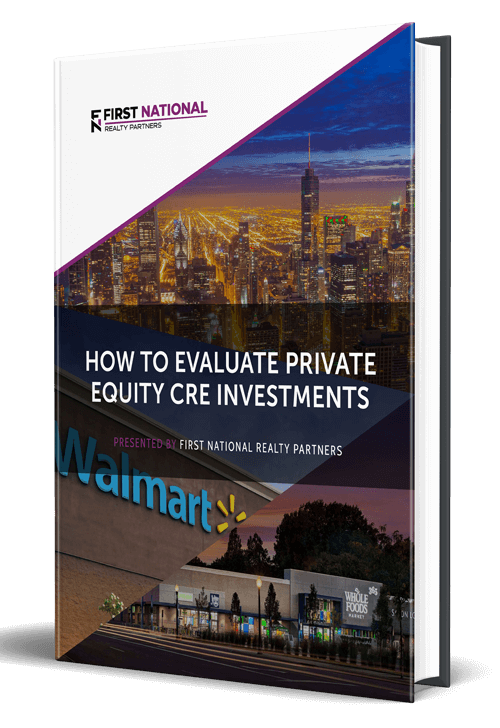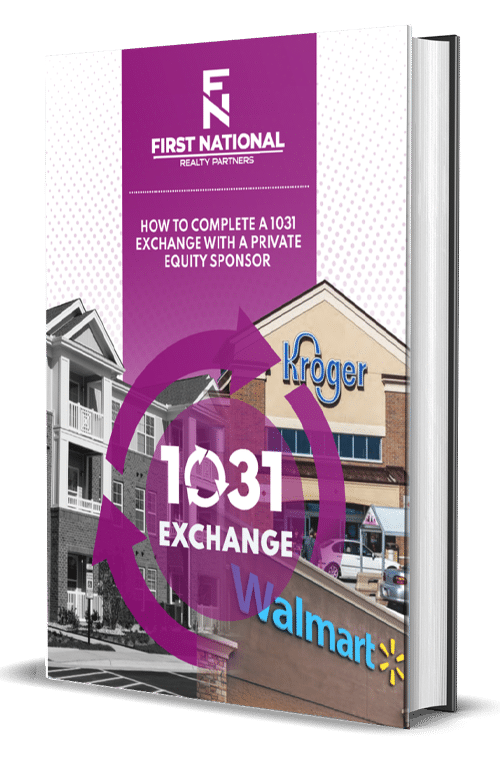One of the most important metrics an investor looks at when analyzing the acquisition of a piece of commercial real estate is the CAP rate. The CAP rate is the property’s net operating income (NOI) divided by its hypothetical purchase price. It’s a straightforward way to figure out how many times “earnings” a property is being offered for.
Buying at higher cap rates means more initial cash flow and a lower sales price-to-earnings ratio; it certainly does not tell the whole story. And that’s an important part of capitalization rates. High cap rates don’t always mean good cap rates.
In this article, we’ll explain rules of thumb for high and low cap rates, what is the cap rate trap, and how cap rates enter into an investor’s long-term vision.
Interested in diversifying your portfolio into commercial real estate backed by high-credit, national tenants? If you’re an accredited investor, click here to see how FNRP gives you the opportunity to invest in world-class, institutional-quality CRE deals.
Commercial Real Estate Capitalization Rate (CAP Rate) Rules of Thumb
While mispriced assets are sold all the time, and special situations do happen frequently in real estate, the general rule for cap rate calculation of investment opportunities is simple:
Lower Market Cap Rates = Lower Risk (perceived), Greater Income Durability, and More Potential for Appreciation
Higher Market Cap Rates = Higher Risk (perceived), Less Income Durability, and Less Potential for Appreciation
Long term, what matters in real estate investing is your total internal rate of return, which factors in your cash flow plus your appreciation. I think we all understand that success has been had buying in traditionally low cap rate environments.
Major cities and investors have lost money buying in high cap rate markets and vice versa. Most investors understand that an asset’s CAP rate is not the entire story on a deal. There are plenty of other factors to consider such as interest rates, value-add opportunities, class A, B, C, or below, and a ton of others when qualifying a potential investment property.
What I am referring to specifically though, is what I call the cap rate trap.
What is the Cap Rate Trap?
CAP Rate Trap = Higher Cap Rates Mean Higher Long Term Cash Flow In An Investment Property
Let me give you an example to illustrate the cap rate trap in an investment property. Let’s say you buy two identical apartment buildings, with identical financing scenarios, but in different markets.
You buy one at a 6 CAP and the other at a 9 CAP. There is no question that out of the gate you are going to have higher cash on cash return on the 9 CAP multifamily deal. But because of a weaker market and maybe a weaker location, the 9 CAP deal starts to have more tenant turnover causing higher operating expenses due to turn costs and longer vacancy periods.
In this example, your 6 CAP deal, due to a better market and location, keeps tenants in place longer and your net operating income trends higher and continues to grow as the stronger market commands greater rents. Just because you paid 9 CAP, your actual CASH FLOW IS LESS than the 6 CAP over your 10-year holding period.
We are not even factoring any appreciation or total internal rate of return into this scenario. Just from a cash-on-cash return standpoint.
So, from a pure cash flow basis, you can very well make more free cash flow and a better return on investment on a low cap deal, than a higher cap deal.
This should not be construed as advice to start buying lower CAP rate deals over higher CAP rate deals. Everyone’s investment strategy and goals are different. Our firm is value-oriented. So if we are looking at core deals and think a market rate for an asset is 7 CAP, we’re still looking to buy it at 9. If the market is 5 CAP, we’re looking to pay 7.5, and so on and so forth.
CAP Rate and an Investor’s Long-Term Vision for Commercial Real Estate
It all comes down to an investor’s long-term vision.
If you are planning to hold assets for the long haul, market fundamentals and NOI growth play a huge role. You may be buying a 6 CAP today, but if you can steadily increase NOI, not only will your cash on cash return increase, but your back end appreciation through the assets market value at sale will probably be higher than an 8 CAP deal in a market that has high turnover, operating costs, and less upside for appreciation.
With commercial property, your potential return in any asset class will be based on your strategy at purchase. Every real estate market varies and has different cap rates and property values. Grocery-anchored shopping center cap rates differ from the office spaces and so on. It’s on you to match the rental property you are considering at its current market value with the investment strategy you’ll deploy for success.
The beauty of real estate versus the stock market is that even in a hot “low cap” market, real estate investors and value hounds can find more mispriced assets and opportunities on a comparative basis with real estate investment.
In my opinion, the stock market certainly has mispriced situations, they just come across less frequently than non-traded private businesses or real estate assets.
Don’t fall into the CAP rate trap.
Interested In Learning More?
First National Realty Partners is one of the country’s leading private equity commercial real estate investment firms. We leverage our decades of expertise and our available liquidity to find world-class, multi-tenanted assets below intrinsic value. In doing so, we seek to create superior long-term, risk-adjusted returns for our investors while creating strong economic assets for the communities we invest in.
If you are an Accredited Investor and would like to learn more about our investment opportunities, contact us at (800) 605-4966 or info@fnrpusa.com for more information.






